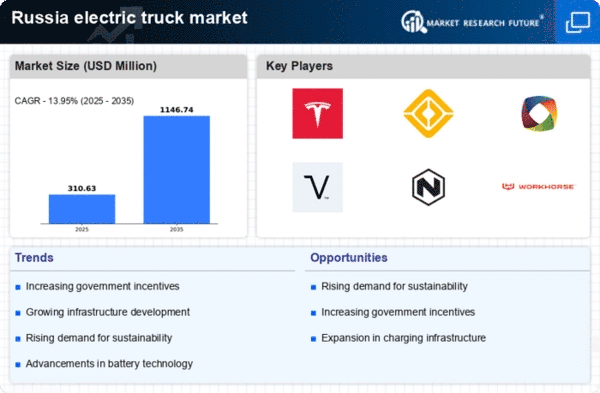Rising Fuel Costs
The electric truck market in Russia is experiencing a notable shift due to the rising costs of traditional fuel sources. As diesel prices fluctuate, logistics companies are increasingly seeking alternatives that can mitigate operational expenses. Electric trucks, with their lower energy costs, present a compelling solution. Reports indicate that electric vehicles can reduce fuel costs by up to 70%, making them an attractive option for fleet operators. This economic incentive is likely to drive the adoption of electric trucks, as companies aim to enhance their profitability while adhering to environmental standards. The transition to electric trucks may align with broader sustainability goals and further propel the electric truck market in Russia.
Environmental Regulations
Stringent environmental regulations aimed at reducing emissions significantly influence the electric truck market in Russia. The government has implemented various policies to curb air pollution, particularly in urban areas. These regulations often favor electric vehicles, as they produce zero tailpipe emissions. As cities like Moscow and St. Petersburg enforce stricter emission standards, the demand for electric trucks is expected to rise. Companies that fail to comply with these regulations may face hefty fines, thus incentivizing a shift towards electric trucks. The alignment of regulatory frameworks with market dynamics suggests a robust growth trajectory for the electric truck market in Russia.
Corporate Sustainability Initiatives
In recent years, many corporations in Russia have adopted sustainability initiatives that prioritize reducing their carbon footprint. The electric truck market is poised to benefit from this trend, as businesses seek to align their logistics operations with environmentally friendly practices. Companies are increasingly recognizing that transitioning to electric trucks not only enhances their brand image but also meets the expectations of environmentally conscious consumers. This shift is likely to be supported by investments in electric truck fleets, as firms aim to achieve their sustainability goals. The growing emphasis on corporate responsibility may thus serve as a catalyst for the electric truck market in Russia.
Investment in Renewable Energy Sources
Increased investment in renewable energy sources is crucial for the sustainability of electric vehicle operations in the electric truck market in Russia. As the country seeks to diversify its energy portfolio, the integration of solar, wind, and hydroelectric power into the grid is becoming more prevalent. This shift not only supports the charging infrastructure for electric trucks but also ensures that the energy used is cleaner and more sustainable. The potential for lower electricity costs associated with renewable energy could further incentivize logistics companies to adopt electric trucks. Thus, the synergy between renewable energy investments and the electric truck market is likely to foster growth in Russia.
Technological Innovations in Electric Vehicles
Rapid technological innovations in electric vehicle design and performance are propelling the electric truck market in Russia. Advances in battery technology, such as increased energy density and faster charging capabilities, are making electric trucks more viable for long-haul transportation. The introduction of new models with improved range and efficiency is likely to attract more buyers. Furthermore, the integration of smart technologies, such as telematics and autonomous driving features, enhances the appeal of electric trucks. As manufacturers continue to innovate, the electric truck market is expected to expand, catering to a broader range of logistics needs in Russia.
















